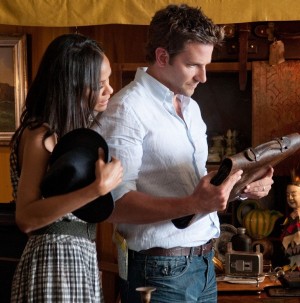‘The Words’: It Seemed Like A Good Idea On Paper…
We all have something to say. However, precious few of us have lived experiences unique enough to be recounted and fewer still have the perspicacity to express their innermost thoughts and desires into significant art. As the drama The Words shows us, even those who fit into the interlocking aggregates of that particular Venn diagram might not be entirely original.
When Rory Jansen (Bradley Cooper) began a career in writing, he knew the risks involved. Still, that doesn’t make it any easier to cope with a lengthy battle with the creative process, the humiliation of being unable to support himself and his wife (Zoë Saldaña), and the inevitable realization that a mounting pile of rejection letters isn’t getting any smaller. On the brink of giving up entirely, the unfulfilled author discovers something tucked away for decades within the pockets of a well-worn leather satchel. Rory’s find is an unpublished novel, a tale of love and loss in post-World War II France, amounting to one of the greatest pieces of prose he has ever read, leading to despair knowing he can never match such grandeur himself. But no one else needs to know that… One thing leads to another, and in no time, Rory passes off the unknown book as his own, garnering the bestseller status, critical adoration and industry awards he has always desired. Even as he’s riding high, Rory knows the truth about his work, leading to the day he hoped would never come, an encounter with the true author (Jeremy Irons).
Even after starring in last year’s Limitless, Cooper doesn’t quite have the hang of playing the part of the overwrought wordsmith. To the Hangover actor’s credit, this time he doesn’t have the benefit of brainy pills to assist in his goal of constructing a masterpiece. Somehow, it’s just much easier to believe him as the kind of writer who “accidentally” plagiarizes someone else’s work as a way to get his foot in the door for his own writing. It’s after the accolades when Cooper steps up, with Rory beset with remorse for ripping off a yellowed, ink-smeared manuscript that he finally realizes meant the world to someone many years before. As the aged man in question, 60-something Irons never misses a step as the anonymous writer old enough to be an octogenarian if he’s a day. It’s more than just a great make-up job — Irons wastes no time in convincing the audience that he’s lived for years with the frustrating setback of losing such an opus only to have someone else take credit for it, with an unappealing title to boot. Not to mention the events in his life that inspired such a sad tale. Prince Caspian himself, Ben Barnes, makes a valiant effort as Irons’ younger self, a naïve American soldier whose love affair with a Parisian waitress (Nora Arnezeder) marks the best and worst days of his existence.
If all these details seem too much to take, remember it’s all just a work of fiction, as read by its author, Clayton Hammond (Dennis Quaid) to a sold-out crowd of sycophants and literary groupies, one of whom (Olivia Wilde) is extremely intent on learning the ins and outs of how such a story came to be. The story-within-a-story style is tricky enough, but the more layers you add to it, the more you’re juggling and the more you have to lose if you’re not careful, as seen in features like Charlie Kaufman’s brilliant screenplay Adaptation, his less consistent Synecdoche, New York, or Jared Hess’s and Mike White’s uneven but underappreciated Gentlemen Broncos. It’s this framing device that makes or breaks the movie, depending on how you want to look at it.
Let’s start from the ground floor and move up. If it’s a film about the nameless old man and everything he’s gone through, it’s woefully beautiful yet tragically meager since we only get bits and pieces of his account. If it’s a film about Rory and his guilt-riddled doings, we can’t really feel too sorry for a thief, no matter what the circumstances, especially someone who comes up with a book name like “The Window Tears” — lame. And, last but not least, if it’s a film about Clayton, Quaid is used so sparingly we have no connection to him and by extension, the characters he has given us. What all these men have in common are the women who influence them, but the fairer sex is seen purely as a muse and little more, except Wilde, who’s out of place entirely. First-time writer-director team Brian Klugman and Lee Sternthal don’t aim so high as to give an existential examination of the whole ordeal, but their treatment of the many planes of such an ambitious story just doesn’t connect consistently, though the cast does an amicable job of showing the fundamental heart and soul every scribe must put into the material he types and the terrible crime of violating the link between a writer and his own words.
All other problems aside, the conflict that keeps The Words from functioning the way it should is its resolution, or lack thereof. Klugman and Sternthal shoot for an explosive ending that never comes, cutting themselves short when it seems like they want to have the last word on the subject.
Rating: 2 out of 4 stars


